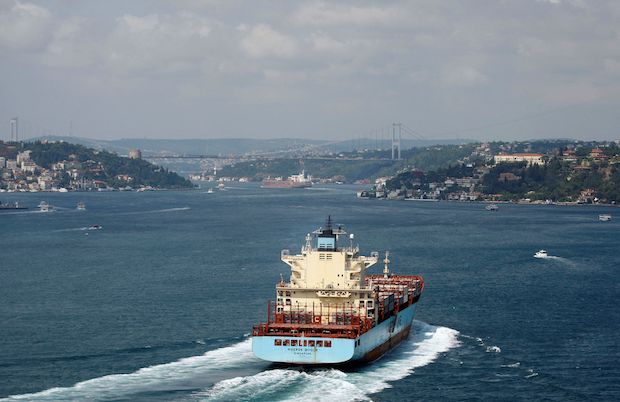Ukraine says Russia planting mines in Black Sea

An oil tanker passes through the Bosphorus to the Black Sea in Istanbul July 20, 2012. (REUTERS/Osman Orsal/File Photo)
LONDON — Ukraine accused Russia on Wednesday of planting mines in the Black Sea and said some of those munitions had to be defused off Turkey and Romania as risks to vital merchant shipping in the region grow.
The Black Sea is a major shipping route for grain, oil, and oil products. Its waters are shared by Bulgaria, Romania, Georgia, and Turkey as well as Ukraine and Russia.
Russia’s military took control of waterways when it invaded Ukraine on Feb. 24, in what Moscow calls a “special operation”.
In recent days Turkish and Romanian military diving teams have been involved in defusing stray mines around their waters.
Ukraine’s foreign ministry said Russia was using naval mines as “uncontrolled drifting ammunition”.
Article continues after this advertisement“It was these drifting mines that were found March 26-28, 2022 off the coasts of Turkey and Romania,” it said in a statement.
Article continues after this advertisementThe ministry said: “The deliberate use by Russia of drifting sea mines turns them into a de facto weapon of indiscriminate action, which threatens, first of all, civil navigation and human life at sea in the whole waters not only of the Black and Azov Seas but also of the Kerch and Black Sea Straits.”
Russian officials did not immediately respond to requests for comment.
Accusations
Earlier this month Russia’s main intelligence agency accused Ukraine of laying mines to protect ports and said several hundred of the explosives had broken from cables and drifted away. Kyiv dismissed that account as disinformation.
A Ukrainian foreign ministry official told Reuters separately that the sea mines were of the “R-421-75” type, which were neither registered with nor used by Ukraine’s navy currently.
The official said mines of this type – some 372 units – had been previously stored at Ukraine’s 174th armament base in Sevastopol and were seized by Russia’s military during its annexation of Crimea in 2014 – a move not recognized internationally.
“Russia, using sea mines seized in 2014, deliberately provokes and discredits Ukraine to international partners,” Ukraine’s foreign ministry added separately.
London’s marine insurance market has widened the area of waters it considers high risk in the region and insurance costs have soared.
Five merchant vessels have been hit by projectiles – with one of them sunk – off Ukraine’s coast with two seafarers killed, shipping officials say.
“Vessels navigating in the Black Sea should maintain lookouts for mines and pay careful attention to local navigation warnings,” ship insurer London P&I Club said in an advisory note on Tuesday.
RELATED STORIES
Biden says ‘we’ll see’ if Russia de-escalates in Ukraine
Ukraine isn’t naive, Zelensky says after Russia pledges to scale down attack on Kyiv
‘No handshake’ as Ukraine, Russia delegations meet for peace talks